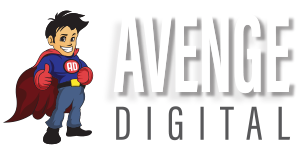
We live in the age of instant gratification and consumers often don’t give you a chance to explain the value you think you can provide. They are too busy, and have too little faith in the hordes of producers and companies that reach out to them on a daily basis. Unfortunately, they have learned through experience that these knee-jerk objections are the best defense against people wasting their time. This forces agency owners and producers to be more assertive and persistent. Even when you are using an inbound marketing solution like Avenge Digital, you will deal with objections. That's just the part of any business but the vast majority of the time what happens is a knee-jerk reaction from busy people who don’t yet see the value in working with you. That's not a reflection of you! Nearly all objections at the prospecting phase of the sales and quoting process fit into one of two categories either they don’t understand the value & are too busy to think about it, or they are not ready for a buying conversation. Also broken down very simply: "Time or Money"
There are two over-arching tips to formulate how to overcome objections:
1. Articulate value early and concisely
By simply respecting your prospects' time and explaining what you want early in your conversation, you can quickly express your mutual respect for THEIR value. Every email, voicemail, and phone interaction should lead with an assurance that you won’t take much time, followed by a short 30 seconds of a customized value proposition. Around the office, we call it the 30-second bull ride. Explain your value to your potential client quickly and concisely.
2. Don’t sell the product, sell the next step
One of the worst tips I learned early on in my sales career is to assume that everyone wants to buy from you. Yes, you might have a 5-star rating, and referrals rolling in, but any new prospect does not care how you've treated others as much as how you are going to treat them. Do cold call closes happen? Of course they do, but ultimately it does not matter if the prospect is ready for a buying conversation on the first call. How could they be? It's possible they've only just learned about you and your product from this call. If they ask a policy question, use the opportunity to show you are their trusted adviser.
With these ideas in mind, I want to share with you some of the top types objections we hear and ways your team can overcome them!
1. The brush-off
What the consumer says: "Just send me some information on the policy."
This objection varies in intent depending on when it comes up in your call with a prospect:
- If it comes up before you have had the chance to deliver your value proposition and explain who you are and what you do, it’s very clearly a brush-off.
- If it comes afterward, but before you’ve had the chance to ask qualification questions, there may be interest, but the prospect isn’t yet willing to talk about it further.
- If it comes at the end of your call, after you’ve gone through both your value prop and qualification, the prospect may have decided this isn’t valuable somewhere along the way.
How do you respond?
There are a few potential responses to this one, depending on what stage the call is in.
- Before you've delivered the value proposition: "Can we take 30 seconds now for me to explain what we do, and you can then decide if it’s worth at least a follow-up?"
- Before qualification: "Can I ask you a couple questions quickly to better understand how we might help?"
- After qualification: "Typically, people find it more valuable to talk out any concerns to see if I can answer any unresolved questions."
2. The BUDGET
What the consumer says: "I don’t have budget for this."
If budget is an important part of your qualified lead definition, this may be a stopping point. It is important to dig a bit further to understand what not having budget means. Can they not afford it?Is the timing bad? Could your buyer find the money elsewhere if you show enough value? In most cases, the prospect doesn’t need to have a budget at this stage of the process, and producers should leverage this fact to overcome this objection.
How do you respond?"That’s okay. We don’t expect you to buy anything right now. We’d just like the opportunity to share what we are doing and see if it’s valuable to you and provide a quote. Can we schedule a follow up call over the next couple days?”
3. THE Competition
What the consumer says: "We already have a quote, or a policy with Competitor A." or "I was only looking for Competitor A"
This is where it’s important to know why you are unique, and be able to explain that value clearly. Your prospect just heard, “Hi, we do X” and thought, “Oh, we have that, we’re good.” or "I saw this specific value". Your prospects are busy -- they don’t want to fix things that aren’t broken. It is your duty to change their mindset, and explain why they need the specific value you provide. Additionally, if a consumer is looking for a competitor because of a specific value prop, wouldn't you WANT to tell them if you offer the same, or even better value?
How do you respond?
"We’d just like the opportunity to show you how we are different and how we have provided additional value to our customers. We can work with your needs and find out more about what specifically drew you to our competitor. When is a good time to schedule a follow up call?"
4. PROCRASTINATION
What the consumer says: "Call me back later."
Prospects are busy. They will push anything off to tomorrow because today is swamped. Additionally, maybe they are on the road and don't have specific things like VIN number handy. Reassure them that this is not a buying conversation. You just want to show them what you do, and see if there’s value for them.
How do you respond?
"Of course. If it really is bad timing, I’m happy to do that. However, I would still like to set up a five-minute call to show you what we are doing and how we might help. That way, if it’s not interesting, we don’t have to worry about me bothering you, but if it is, we'll have more to talk about then. When is a good day/time for us to chat?"
5. The Clinger
What the consumer says: "Sorry I had to cancel, I’ll get back to you with a better time."
People don't like to say "No" -- and that includes your prospects. This manifests in ghosting, procrastination (as mentioned above), and asking for more time.
You want to call out your prospect’s lack of interest and get them to admit the answer is 'No' without going too negative. If they just can't say yes OR no, and just drag their feet then they are essentially dead in the water.
How do you respond?
"It's understandable that sometimes things happen. You have my email and phone number and am available to you when you're ready."
At this point, many times I would not follow back up with someone. You would be surprised how many people will call back when suddenly they aren't being followed up with. It's does happen! But this brings me to my final point....
When No Means No
At a certain point no means no. The responses to the common objections above give you a way to pierce through the reactionary objections prospects give without thinking. However, if you have said your piece and the prospect still objects, let it go. Nobody is going to buy against their will. Get as clear as you can on the objection and try to determine what your prospect is really concerned about, but don’t push past the prospect’s point of comfort. Rule of thumb: if the prospect says an objection twice, it’s real. No means no.
With these tips, and ways to think about working with your customers, you can show value to people who might have been too closed to see it at first. It takes a bit of extra care, but some of the best clients are the ones who were initially the most skeptical.
Tell us what you think? How do you overcome objections in your agency? We'd love to hear from you!






